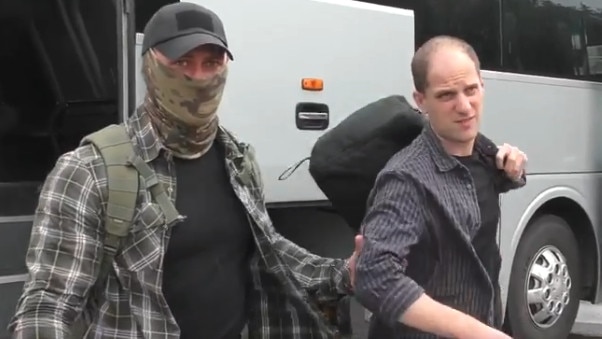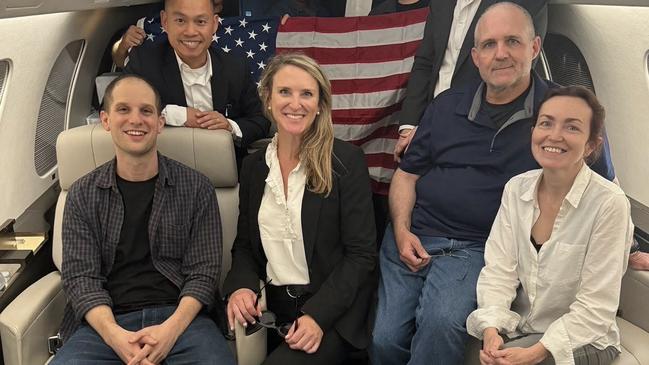Hostage-takers must be met with strength from Uncle Sam
Evan Gershkovich is finally free, but he won’t be the last American taken if US policy doesn’t change.

Everyone at The Wall Street Journal is relieved and grateful for the release on Thursday of our reporter, Evan Gershkovich, from the Russian gulag. He has endured an awful 16-month ordeal. Yet the price of the prisoner swap that won the release of Gershkovich and other Kremlin captives highlights how dictators are using human hostages to promote terrorism beyond their borders.
President Joe Biden announced the prisoner exchange among multiple countries involving 24 individuals at the White House next to relatives of those released. In addition to Gershkovich, they include Paul Whelan, the former Marine accused of espionage and held since 2018 despite denials by the US; Russian-American journalist Alsu Kurmasheva, and; Vladimir Kara-Murza, the courageous British-Russian dissident who contributes to The Washington Post.
Credit to the White House for pulling off this complicated swap. “Multiple countries helped get this done,” Biden said. “They joined a difficult complex negotiation at my request. And I personally thank them all again.”
Americans and the released Russian dissidents owe a particular debt to German Chancellor Olaf Scholz. His country held Vadim Krasikov, the assassin most coveted by Vladimir Putin. Krasikov killed a Chechen emigre in a public park in Berlin in 2019 and was serving a deserved life sentence.
Scholz risked political criticism at home for releasing the spy sent by Putin to kill on German territory. A swap had previously seemed possible for Russian opposition leader Alexei Navalny, but the Russians killed him in prison. The Chancellor fought hard to gain the release of others besides the Americans, and he succeeded in winning freedom for a dozen Russian dissidents.

Gershkovich was held for 491 days after his arrest while on a reporting trip. He was accredited to work as a journalist in Russia and was the first foreign journalist arrested in that country since the days of the Soviet Union.
Our guess is that he was targeted because he had written influential dispatches about the impact of the Ukraine war that defied the Kremlin’s propaganda. His arrest was also intended as a message to other journalists that telling the truth is an occupational hazard.
Gershkovich was ultimately charged with espionage, but the evidence was never made public at his trial; it would have been concocted because he was working for no one other than the Journal’s readers. He was simply a pawn in the Kremlin’s new game of taking hostages to use as leverage to get back the assassins Putin sends to kill opponents of his rule.
The ugly truth is that Russia and other thuggish regimes take hostages because it works. Iran has also made it a policy to arrest innocent Americans to trade for Iranians justly held in the US. China has done the same with Canadians. These countries know that hostages become powerful political symbols in the West, as pressure on democratic leaders increases to negotiate their release.
Putin has paid no price for imprisoning Gershkovich beyond bad publicity, and that he can ignore. At the same time he has won the release of his spies and an assassin. The release of Krasikov means he can tell his killers that even if they are captured abroad, he has a strategy to win their release. All of this poses an awful dilemma for US policymakers. Once a hostage is taken, it is difficult for a president to ignore his or her fate. A better policy would deter the hostage-takers by letting them know they will pay a price if they imprison Americans. The current global perception of US weakness has bad consequences for press freedom and Americans abroad.
After Gershkovich’s arrest, the Biden administration neither arrested any Russians, nor even expelled any Russian journalists in the US. We’re not sure why.
Something will have to change, or more Americans will be taken hostage after this prisoner swap. This will be true for Donald Trump as much as for Kamala Harris next year. Hostage-takers will test any new president. None of this reduces our joy at Gershkovich’s release, but leaders have to think hard about how to prevent the innocent hostages of the future.



To join the conversation, please log in. Don't have an account? Register
Join the conversation, you are commenting as Logout